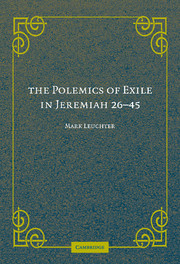Book contents
- Frontmatter
- Contents
- Acknowledgments
- List of Abbreviations
- Note on Citations
- Introduction
- 1 The Hermeneutics of Citation: Jeremiah 26
- 2 The Identification of Legitimate Israel: Jeremiah 27–32:15
- EXCURSUS 1 THE REDACTION OF JEREMIAH 1–25:13+OAN
- EXCURSUS 2 THE REENGAGEMENT OF THE ROYAL LINE IN JEREMIAH 33:14–26
- 3 The Standards of Faith and Intermediation: Jeremiah 34–36
- 4 The Fall of Judah, the Descent into Egypt, and Baruch ben Neriah: Jeremiah 37–45
- EXCURSUS 3 THE “WORDS OF JEREMIAH” AND SERAIAH'S COLOPHON IN THE MT AND LXX TRADITIONS
- 5 The Polemics of Exile
- 6 The Exilic Coalition between the Shaphanides and Levites
- Conclusion
- Notes
- Bibliography
- Author Index
- Scriptural and Extra-Biblical Texts Index
- Subject Index
5 - The Polemics of Exile
Published online by Cambridge University Press: 27 July 2009
- Frontmatter
- Contents
- Acknowledgments
- List of Abbreviations
- Note on Citations
- Introduction
- 1 The Hermeneutics of Citation: Jeremiah 26
- 2 The Identification of Legitimate Israel: Jeremiah 27–32:15
- EXCURSUS 1 THE REDACTION OF JEREMIAH 1–25:13+OAN
- EXCURSUS 2 THE REENGAGEMENT OF THE ROYAL LINE IN JEREMIAH 33:14–26
- 3 The Standards of Faith and Intermediation: Jeremiah 34–36
- 4 The Fall of Judah, the Descent into Egypt, and Baruch ben Neriah: Jeremiah 37–45
- EXCURSUS 3 THE “WORDS OF JEREMIAH” AND SERAIAH'S COLOPHON IN THE MT AND LXX TRADITIONS
- 5 The Polemics of Exile
- 6 The Exilic Coalition between the Shaphanides and Levites
- Conclusion
- Notes
- Bibliography
- Author Index
- Scriptural and Extra-Biblical Texts Index
- Subject Index
Summary
at every turn, the supplement addresses the judean community in Babylon arising from the various deportations to that city. Jeremiah himself becomes a character in the narratives within the Supplement, manipulated by the author as a symbol of the deportees' own experience. He shares in the prohibition from living in his ancestral homeland (Jer 37:11–14), he is imprisoned and given rations like Jehoiachin (Jer 37:15; cf. 2 Kgs 25:27, 30; Jer 38:32–34), and he is cast into a pit (רוב), only to sink into the mud in a miserable sort of nether existence (Jer 38:6), paralleling the questions of the afterlife that would have accompanied the exile to Babylon. Indeed, his experience in the pit is reflected in a dirge to Zedekiah by the women of the royal circles who are brought to Babylon, though this dirge is couched in liturgical terminology (Jer 38:22). Finally, Jeremiah is forcibly taken captive to a foreign land (Jer 43:6–7), to live among a people who are not part of the covenantal community.
In every one of these instances, the perpetrators are the post–597 BCE Judeans of Jerusalem or those who settled in Egypt, who have become foreigners. It is for this reason that the judgment pronounced upon them in Jeremiah 44, though exilic, does not include captivity among the list of punishment yhwh will inflict on them (in v. 13); the Judeans of Egypt are themselves the captors who have taken Jeremiah and Baruch against their will.
- Type
- Chapter
- Information
- The Polemics of Exile in Jeremiah 26-45 , pp. 145 - 165Publisher: Cambridge University PressPrint publication year: 2007



